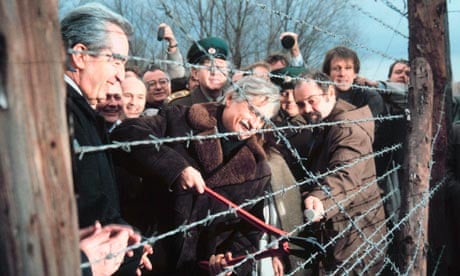Those who visited Jiri Dienstbier at his Prague flat in the months before the Velvet Revolution of 1989 had no idea of what was in store for the dissident journalist who had earlier spent three years in prison for his opposition to a tired and crumbling regime. Still banned from public activities, and employed as a boilerman (a typical occupation allotted by the authorities to politically offending citizens), he greeted the minder who watched over him from outside the house and joked to us about the letter he had received from the telephone company in response to his complaint that his phone was out of order. "There is a technical fault," he was informed, "and we see no prospect of it being repaired."
Dienstbier, who has died aged 73 of cancer, was suddenly appointed on 10 December that year to be foreign minister of Czechoslovakia, as the old regime collapsed and Václav Havel came to preside over the destiny of the nation. The new minister recalled later that he had to attend to his boiler before appearing at his first cabinet meeting.
Born in the city of Kladno, north-west of Prague, and employed as a reporter and presenter by Czech national radio from 1958 to 1969, he was its correspondent in the US at the time of the Soviet-led invasion of his country in August 1968. Instead of choosing freedom in the west, he returned home to join others in opposing those who had destroyed the dreams of the Prague Spring. He had joined the Communist party as a student in 1958, and was expelled from it in 1969.
In 1977, Dienstbier was one of the 250 initial signatories of Charter 77, which called for the restoration of civil liberties in Czechoslovakia. He became spokesman for the movement and participated in editing many underground publications – offences that led to his three years in prison from 1979.
One of the re-founders of the historic newspaper Lidové Noviny (People's Daily), which promoted the aims of the Velvet Revolution, he might have expected to return full-time to journalism at the end of 1989. Instead, he was propelled into the job of foreign minister and later also deputy prime minister, roles he filled efficiently and colourfully until 1992, when his independent left political position fell out of favour. Dienstbier's vision of a progressive and democratic society did not gel with the plans of those in the Czech Republic who have concentrated on the free play of market forces.
The photographs of Dienstbier cutting through the barbed wire that had so long divided Czechoslovakia from Germany and Austria are a potent image of the end of the cold war, and he played a big part in diplomatic moves to restore relationships across central Europe. His memoirs of the years 1989 to 1999, Od Snenik Realite (From Dreams to Reality), are peppered with the irreverent humour that made him a worthy successor of Jan Masaryk, the much-loved Czechoslovak foreign minister of wartime and postwar years.
After leaving the government, Dienstbier filled other diplomatic roles. He was UN commissioner for human rights in the former Yugoslavia between 1998 and 2001 (when he opposed the Nato bombing of Serbia) and named later as a roving ambassador. He always delved back into politics, teaching and journalism. He led a now defunct centre-left party, the Civic Movement, until 1996. In 2008, he sought unsuccessfully to stand against the incumbent, Václav Klaus, for the Czech presidency, but he was elected in the same year as an independent senator on the ticket of the Social Democratic party.
He always returned from abroad full of ideas. At my last meeting with him in a bar in Prague a couple of years ago, he was full of stories of America and the way its GDP is ostensibly so much greater than that of the Czechs. "When their lightbulbs go, they call in an electrician and pay him for putting in another one," he said with that twinkle in his eye. "We Czechs replace lightbulbs ourselves, so the operation doesn't get recorded in our GDP." Those who met the delightful dissident will remember his impish humour, and the panache he displayed in serving causes he supported rather than his own self-advancement.
Dienstbier is survived by his wife, Jirina, a son and two daughters.
